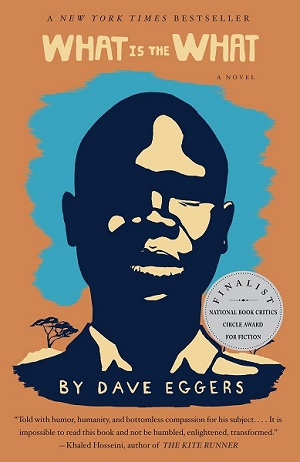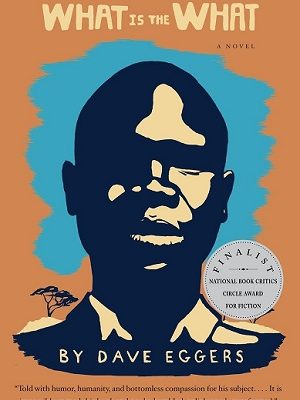What is the What by Dave Eggers tells the powerful and moving story of Valentino Achak Deng, one of the “Lost Boys” of Sudan, as he journeys through war, refugee camps, and eventual resettlement in the United States. Eggers weaves a narrative of survival, resilience, and hope, shedding light on the global refugee crisis and the human capacity for endurance. The book not only provides a poignant account of Deng’s life but also offers deep lessons on war, displacement, and the human condition. Below are 9 lessons from the book:

Read: Man’s Search for Meaning
1. The Resilience of the Human Spirit
The story of Valentino Achak Deng showcases the incredible resilience of the human spirit in the face of unimaginable hardship. As one of the “Lost Boys,” Deng faces starvation, violence, separation from family, and endless uncertainty during his journey from war-torn Sudan to refugee camps in Ethiopia and Kenya.
- Key Takeaway: Even in the face of overwhelming adversity, humans have an extraordinary ability to adapt and persevere. Resilience, strength, and hope can see us through the darkest times.
- Application: When faced with personal struggles, reflect on the resilience displayed by individuals like Deng. Recognizing your own inner strength can help you push through challenging situations.
Lesson: Human resilience knows no bounds, and the capacity to survive, adapt, and thrive is deeply embedded in our spirit.
2. The Power of Hope and Belief
Throughout the novel, hope is a central theme that sustains Deng. Even in the most harrowing circumstances—when faced with brutal militias, life in refugee camps, and uncertain futures—Deng holds onto the belief that things will get better. This hope is what propels him forward through years of displacement and hardship.
- Key Takeaway: Hope can be a lifeline, allowing individuals to endure and overcome even the most challenging circumstances. Without hope, the human spirit is easily broken.
- Application: Cultivate hope during tough times by focusing on a brighter future, no matter how far away it seems. Keeping a vision of what could be, like Deng did, can motivate you to keep moving forward.
Lesson: Hope is a powerful force that sustains us in times of despair, giving us the strength to endure hardship and the motivation to keep going.
3. The Harsh Realities of War and Displacement
One of the most significant lessons from What is the What is the brutal reality of war and its impact on innocent civilians. The civil war in Sudan tore apart families and communities, forcing millions into exile. Deng’s harrowing journey, from witnessing the destruction of his village to enduring refugee camps, highlights the devastating consequences of war on individuals and societies.
- Key Takeaway: War and conflict have long-lasting effects on individuals, especially children, who are often the most vulnerable. Displacement, loss of family, and the destruction of communities are tragic realities for millions around the world.
- Application: Cultivate empathy and awareness about the global refugee crisis. Understanding the human cost of war encourages us to support humanitarian efforts and advocate for peace.
Lesson: War leaves a lasting impact on the most vulnerable populations, and the world must take responsibility for addressing the refugee crisis with compassion and support.
4. The Struggle for Identity and Belonging
As Valentino transitions from being a refugee in Africa to resettling in the United States, he struggles with his identity and finding a sense of belonging. In America, he encounters prejudice, isolation, and cultural dissonance. Despite being physically safe, he faces emotional and psychological challenges as he tries to reconcile his Sudanese heritage with his new life in the U.S.
- Key Takeaway: Displacement often leads to a deep struggle for identity. The feeling of being “other” in a foreign land can be just as difficult as the physical hardships faced during migration.
- Application: Acknowledge the emotional and psychological challenges faced by refugees and immigrants. It’s important to offer understanding, compassion, and support as they navigate new environments and identities.
Lesson: The struggle for identity and belonging is a profound challenge for refugees, who must reconcile their past with their new realities in foreign lands.
5. The Importance of Community and Connection
Throughout the novel, Deng’s survival is often tied to the connections he makes with others. Whether it’s through fellow refugees, aid workers, or friends in America, community plays a vital role in providing support, comfort, and strength. It’s through these connections that Deng finds hope and the ability to rebuild his life.
- Key Takeaway: Human connections and a sense of community are crucial for emotional and physical survival. In times of hardship, relying on others for support can make all the difference.
- Application: Build and nurture relationships in your life, as they are invaluable sources of strength and comfort. In times of need, don’t hesitate to reach out for support from your community.
Lesson: Community and human connection provide essential emotional support, especially during times of great hardship and uncertainty.
6. The Long-Lasting Impact of Trauma
Deng’s experiences of violence, loss, and displacement leave a deep emotional scar, which he carries with him throughout his life. Even after he reaches the safety of the United States, the trauma of his past continues to affect him. This illustrates the long-lasting psychological impact of war and displacement, even after physical survival is achieved.
- Key Takeaway: Trauma leaves deep emotional and psychological wounds that can persist long after the traumatic events are over. Healing from trauma requires time, patience, and often external support.
- Application: Be mindful of the hidden trauma that individuals, especially refugees, may carry. Offer empathy, and if you are struggling with trauma yourself, seek professional help and create a supportive environment for healing.
Lesson: Trauma from war and displacement has long-lasting effects, and healing requires time, support, and understanding.
7. The Value of Education and Opportunity
Despite all the hardships, Deng remains determined to pursue education as a path to a better future. He recognizes that education offers the opportunity to rebuild his life and contribute to society. His dedication to learning exemplifies how knowledge and education can empower individuals to overcome adversity and change their circumstances.
- Key Takeaway: Education is a powerful tool for personal transformation and empowerment, offering individuals the chance to rebuild their lives and contribute positively to the world.
- Application: Value education as a lifelong process that provides opportunities for growth and transformation. Support initiatives that provide educational opportunities for those affected by conflict and displacement.
Lesson: Education offers a pathway to transformation, allowing individuals to rise above their circumstances and build a better future.
8. The Unfairness and Inequality of the World
Throughout his journey, Deng encounters the stark contrast between his experiences in war-torn Sudan and life in America. The inequality in resources, safety, and opportunity becomes painfully clear. The unfairness of life is a recurring theme, as Deng reflects on how random fate and geography can determine a person’s entire destiny.
- Key Takeaway: The world is often unfair, with immense inequalities in wealth, safety, and opportunity. Recognizing these disparities is the first step toward creating a more just and equitable world.
- Application: Acknowledge the inequalities in the world and seek ways to contribute to more equitable systems. This can be done through advocacy, charitable work, and raising awareness about global issues.
Lesson: Life is unfair, with significant disparities in opportunities and resources. It’s important to work towards greater equality and fairness in the world.
9. The Strength of the Human Will
Deng’s journey is a testament to the strength of the human will. Despite facing extreme hunger, exhaustion, violence, and loss, he never gives up. His ability to continue moving forward, even when the odds are stacked against him, highlights the incredible power of determination and the will to live.
- Key Takeaway: The human will is remarkably strong, and with determination and perseverance, we can survive even the most challenging circumstances.
- Application: When facing your own challenges, draw on your inner strength and willpower. Remind yourself that with determination, you can overcome adversity and reach your goals.
Lesson: The human will is powerful, and with determination, individuals can overcome incredible challenges and adversity.
Conclusion
What is the What offers a powerful exploration of human survival, resilience, and the search for meaning in the face of unimaginable hardship. The lessons from Valentino Achak Deng’s journey resonate deeply with readers, emphasizing the importance of hope, community, identity, and education. The book also sheds light on the global refugee crisis, urging readers to cultivate empathy, support humanitarian efforts, and advocate for a more just and equitable world (Amazon).
By applying these lessons, you can:
- Embrace resilience in the face of adversity.
- Cultivate hope and a sense of purpose.
- Understand the psychological effects of trauma and the importance of community.
- Advocate for education and equality to create a better future for all.
These lessons from What is the What remind us of the strength of the human spirit and the importance of compassion, empathy, and action in the face of global challenges.



